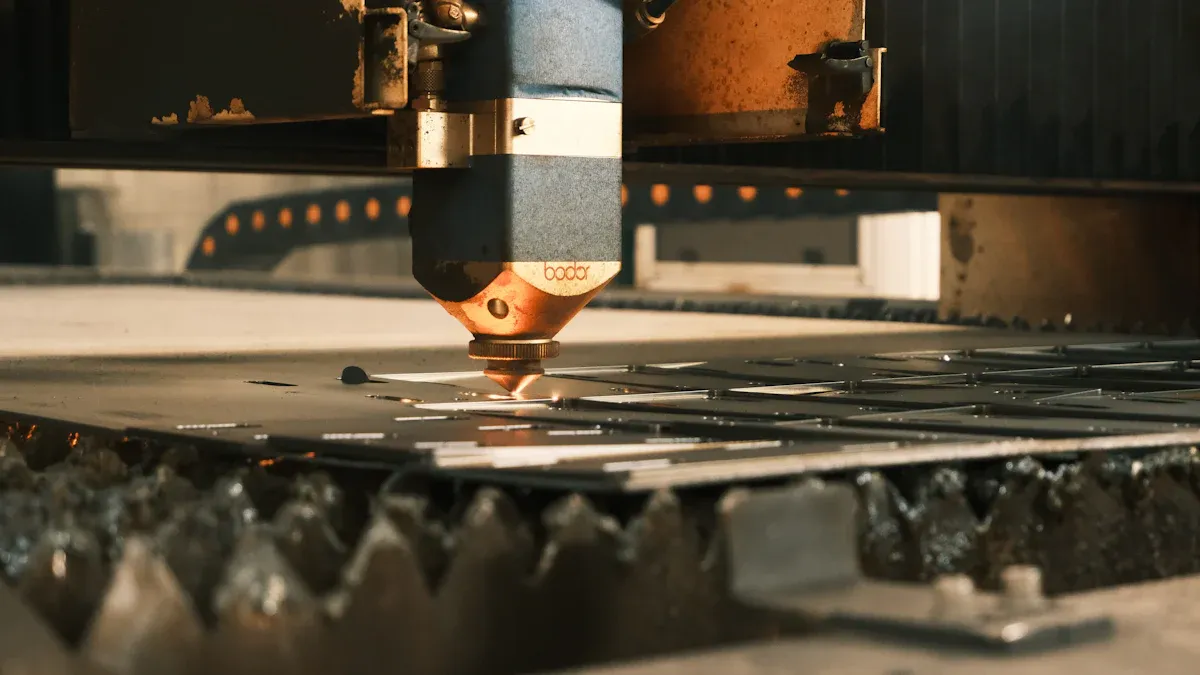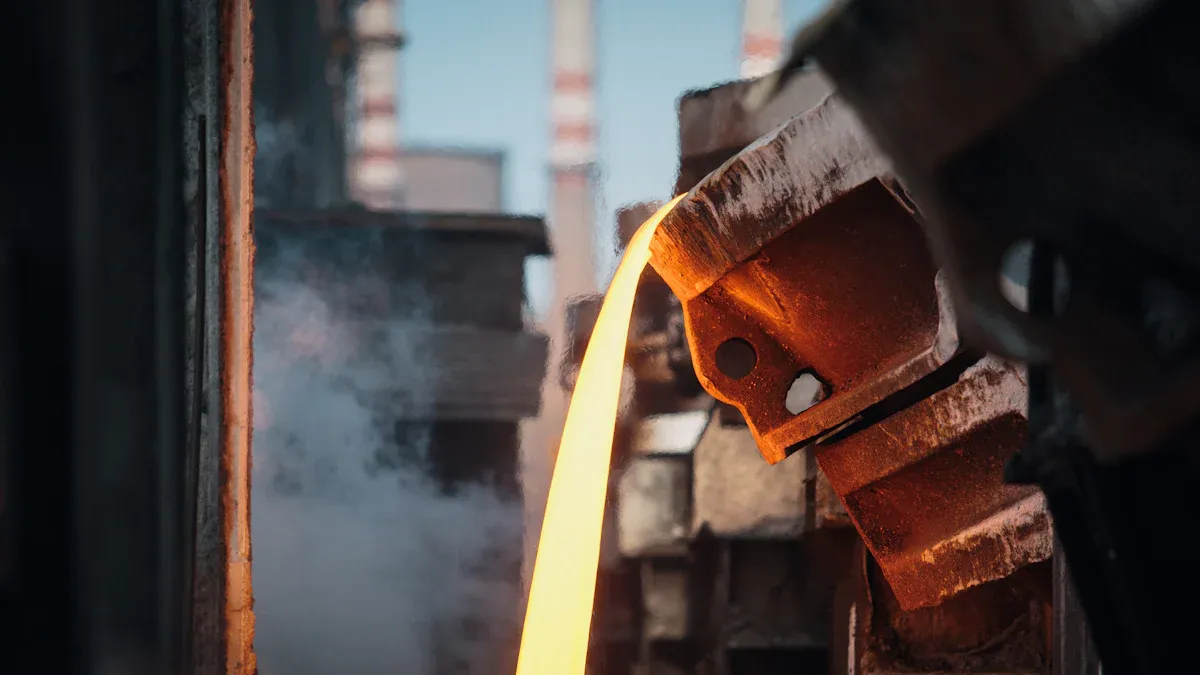
Precision custom castings, a key aspect of the manufacturer industrial application precision custom castings sector, reshape industrial manufacturing by delivering components that meet exact specifications. Industries rely on these industrial application precision custom castings for their ability to handle complex geometries and extreme conditions. The market for manufacturer industrial precision castings, valued at USD 18.16 billion in 2023, is projected to grow to USD 29.48 billion by 2032, driven by demand for lightweight materials in aerospace and automotive sectors, highlighting the importance of manufacturer precision custom castings in meeting these evolving needs.
Key Takeaways
- Precision custom castings help industries by making parts that fit perfectly. These are important for fields like airplanes and cars.
- New tools, like casting simulation programs, make parts more exact. They also save money and make production faster.
- Picking strong materials, like magnesium and aluminum, makes parts last longer. This helps them work well in tough situations.
The Manufacturing Process Behind Manufacturer Industrial Application Precision Custom Castings

Design and Engineering for Precision
Design and engineering form the backbone of precision custom castings. Manufacturers use cutting-edge tools like optical laser scanning and computerized tomography to ensure every component meets exact specifications. These technologies allow for fast and accurate measurements, reducing errors and improving overall quality.
Tip: Casting simulation software, such as Magma, streamlines the development process. It minimizes trial and error, saving time and costs while ensuring precision.
A focus on innovation in design also leads to measurable outcomes. Enhanced accuracy, efficient project management, and improved testing methods are just a few benefits. For example:
| Measurable Outcome | Description |
|---|---|
| Enhanced Accuracy | In-house optical laser scanning and computerized tomography provide fast and accurate measurement of castings. |
| Improved Testing Methods | Casting integrity is verified using air decay or water test equipment as defined in technical agreements. |
| Efficient Project Management | The use of casting simulation and Magma has made the casting development process more efficient, precise, and cost-effective, reducing trial and error. |
| Validation of Material Properties | Tensile testing is conducted to determine yield strength, yield point, tensile strength, elongation, and reduction of area for samples. |
Material Selection for Strength and Durability
Choosing the right material is crucial for creating durable and high-performing castings. Specialized alloys, such as magnesium, aluminum, and zinc, offer unique properties that cater to different industrial needs. Magnesium alloys, for instance, are lightweight yet rigid, making them ideal for aerospace applications.
| Property | Magnesium Alloy | Aluminum Alloy | Zinc Alloy |
|---|---|---|---|
| Weight | 1.8 G/CM3 (30% lower than aluminum) | 2.7 G/CM3 | N/A |
| Yield Strength | 160 MPa | N/A | N/A |
| Tensile Strength | 240 MPa | N/A | N/A |
| Die Casting Property | Wall thickness as low as 0.6mm | Requires >1.2-1.5mm | N/A |
| Shock Absorption | Excellent hysteretic performance | N/A | N/A |
| Rigidity | Twice that of aluminum | N/A | N/A |
| EMI Barrier | Good electromagnetic wave blocking | N/A | N/A |
| Cutting Performance | Better than aluminum and zinc | N/A | N/A |
These materials not only enhance strength but also improve shock absorption and electromagnetic interference (EMI) shielding, making them versatile for various industries.
Advanced Casting Techniques
Advanced casting techniques, like investment casting, revolutionize the production of complex components. This method, also known as lost-wax casting, involves creating a wax model, encasing it in a ceramic shell, and melting the wax to form a mold. The result? Components with tolerances as tight as ±0.1mm, perfect for industries requiring high precision.
- Investment casting enables intricate designs that traditional methods struggle to achieve.
- Selective Laser Sintering (SLS) technology further enhances accuracy, reducing human errors and manufacturing time.
- Studies show that SLS frameworks have a marginal gap of 43.9 μm, compared to 47.5 μm in conventional frameworks, proving its superior precision.
These techniques ensure consistent results across production batches while meeting specific industry requirements.
Quality Control and Testing for Reliability
Quality control is the final step in ensuring the reliability of precision custom castings. Manufacturers use rigorous testing methods, such as air decay and water tests, to verify casting integrity. Tensile testing determines material properties like yield strength and elongation, ensuring components can withstand demanding conditions.
Note: Advanced technologies in quality control not only improve reliability but also enhance efficiency, allowing manufacturers to meet tight deadlines without compromising on quality.
By combining meticulous testing with innovative techniques, manufacturers deliver castings that consistently perform under pressure.
Benefits of Manufacturer Industrial Application Precision Custom Castings
Superior Durability and Structural Integrity
Precision custom castings deliver unmatched durability and structural integrity, making them indispensable for industries like aerospace and automotive. Enhanced sand properties improve surface finishes and dimensional accuracy, ensuring components meet strict safety standards. For example:
| Benefit | Description |
|---|---|
| Superior Surface Finishes | Enhanced sand properties yield higher-quality components with better surface finishes. |
| Dimensional Accuracy | Improved sand characteristics lead to greater precision in the dimensions of cast parts. |
| Industry Applications | Crucial for aerospace and automotive sectors where reliability and precision are essential. |
| Environmental Sustainability | Innovations in sand materials reduce waste and promote eco-friendliness in manufacturing. |
| Production Efficiency | Results in lighter and stronger components, contributing to fuel efficiency in vehicles. |
| Compliance with Safety Standards | Precision in aerospace parts ensures adherence to strict safety regulations. |
These benefits not only enhance product reliability but also contribute to sustainability and efficiency, making precision custom castings a smart choice for manufacturers.
Cost-Effective Production for Complex Components
Investment casting simplifies production by eliminating multiple manufacturing steps, reducing costs and time. This process minimizes material waste and machining needs, making it both economical and environmentally friendly.
| Advantage | Description |
|---|---|
| Cost-effectiveness | Investment casting reduces production time and costs by eliminating multiple manufacturing steps. |
| Minimal material waste | The process uses only the necessary amount of metal, making it environmentally friendly. |
| Reduced need for machining | This process minimizes the need for costly and time-consuming post-casting machining. |
| Single component production | Producing complex parts as a single component reduces assembly costs and errors. |
| Sustainable manufacturing | Reusable molds decrease the need for new mold production, saving time and costs. |
By streamlining production and reducing waste, manufacturers can achieve significant cost savings while maintaining high-quality standards.
Flexibility in Meeting Unique Industrial Requirements
Precision custom castings adapt to diverse industry needs, offering tailored solutions for challenging applications. Whether it’s aerospace components that endure extreme temperatures or automotive parts designed for fuel efficiency, these castings excel in versatility.
| Industry | Requirements | Custom Casting Benefits |
|---|---|---|
| Aerospace | Components must withstand extreme temperatures and mechanical stress | Exceptional strength and durability for critical applications like turbine blades. |
| Automotive | Need for lightweight, high-strength materials for fuel efficiency | Production of gears and crankshafts that meet performance requirements cost-effectively. |
| Construction | Materials must endure harsh environments and wear | Reliable castings for excavation tools and crane parts ensuring longevity. |
| Energy Sector | Robust materials for extreme conditions in power generation and exploration | Superior performance in turbine housings and pump components resistant to corrosion. |
This flexibility empowers manufacturers to innovate and meet the unique demands of their industries, ensuring operational excellence.
Addressing Industrial Challenges with Manufacturer Industrial Application Precision Custom Castings

Aerospace: Meeting Stringent Safety and Performance Standards
The aerospace industry demands components that can withstand extreme conditions while meeting strict safety regulations. Precision custom castings excel in this domain by delivering parts with exceptional accuracy and reliability. Manufacturers use advanced techniques to ensure every component meets the rigorous standards required for flight.
For example, detailed inspection processes validate each part’s compliance with specifications. These inspections include measurements, tolerance checks, and pass/fail results to guarantee safety and performance.
| Aspect | Description |
|---|---|
| Part Identification | Includes part number, revision level, and material. |
| Drawing References | Dimensioned engineering drawings that guide the manufacturing process. |
| Measurement Data | Actual measurements of the part to ensure compliance with specifications. |
| Tolerance Limits | Acceptable range of deviation for each measurement. |
| Pass/Fail Results | Indicates whether each dimension meets the required specifications. |
| Inspection Methods | Tools and techniques used for measurement, ensuring accuracy and reliability. |
These meticulous processes ensure that aerospace components, such as turbine blades and structural parts, meet stringent safety and performance standards. By leveraging precision custom castings, manufacturers can achieve unparalleled reliability in their products.
Automotive: Enhancing Efficiency and Reducing Weight
In the automotive industry, reducing vehicle weight is a top priority. Lighter vehicles consume less fuel, which benefits both consumers and the environment. Precision custom castings play a crucial role in achieving this goal by enabling the production of lightweight yet durable components.
- Metal castings significantly reduce the weight of automotive parts, such as engine blocks, by using advanced alloys.
- Lighter vehicles require less fuel, leading to lower emissions and reduced reliance on fossil fuels.
- Improved fuel efficiency benefits consumers by lowering costs and supports environmental sustainability.
Precision custom castings also enhance efficiency by streamlining production. Manufacturers can create complex parts as single components, reducing assembly errors and costs. This approach not only saves time but also ensures consistent quality across production batches.
Energy Sector: Solutions for High-Stress Environments
The energy sector operates in some of the most demanding environments, from power plants to renewable energy systems. Precision custom castings provide the durability and performance needed to thrive in these conditions.
For instance, gas and steam turbines rely on superalloy castings for their heat resistance and efficiency. Pump and valve components made from stainless steel or bronze offer longevity and corrosion resistance, essential for power plant operations.
| Application Type | Material Used | Key Features |
|---|---|---|
| Gas & Steam Turbine Components | Superalloy castings | Excellent heat resistance and efficiency |
| Pump & Valve Components | Stainless steel, bronze | Longevity and corrosion resistance in power plants |
| Wind Turbine Hubs & Blades | Large cast components | Supports reliability of renewable energy systems |
These materials and designs ensure that energy systems operate reliably, even under high stress. By addressing these challenges, precision custom castings empower the energy sector to innovate and meet growing demands for sustainable power solutions.
Precision custom castings are transforming industries like aerospace, automotive, and healthcare. Their unmatched precision and adaptability stem from advancements in 3D printing and computer-aided design. These innovations enable the production of lightweight, durable components for critical applications. As demand grows, manufacturers leverage these castings to meet complex challenges and drive operational excellence.
FAQ
What industries benefit the most from precision custom castings?
Aerospace, automotive, and energy sectors rely heavily on precision castings for their durability, lightweight properties, and ability to meet strict performance standards.
How do manufacturers ensure the quality of precision custom castings?
They use advanced testing methods like tensile testing, air decay tests, and computerized measurements to verify strength, reliability, and dimensional accuracy.
Tip: Regular inspections and simulations improve consistency across production batches.
Are precision custom castings environmentally friendly?
Yes! Investment casting minimizes material waste and reduces energy consumption, making it a sustainable choice for manufacturers. ♻️
